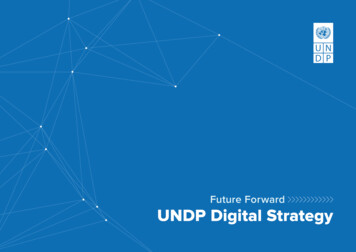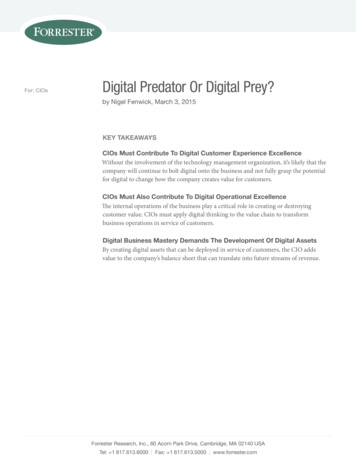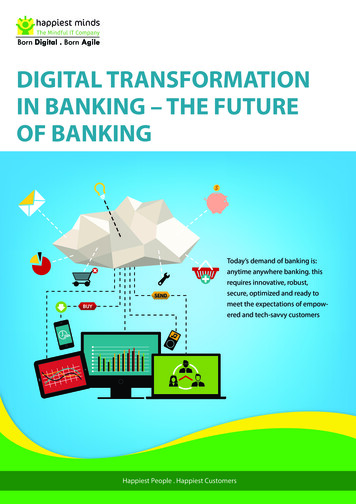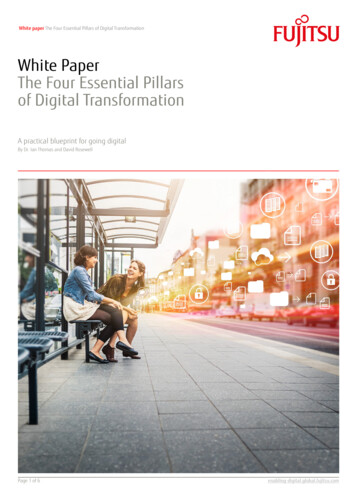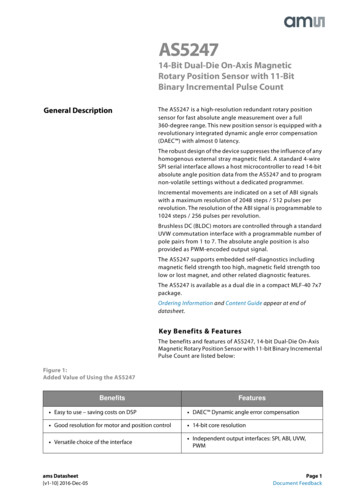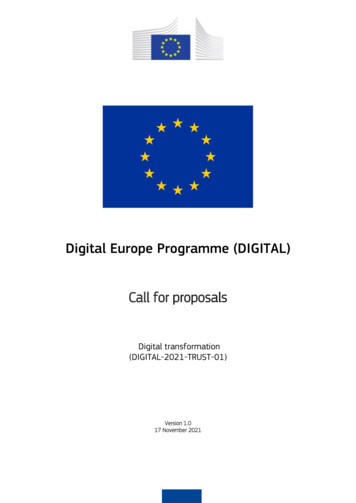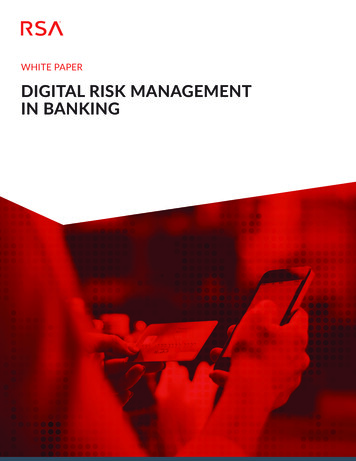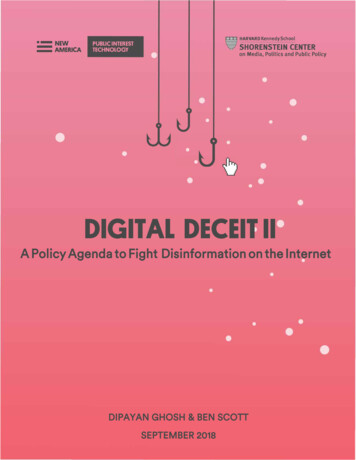
Transcription
-NEW AMERICA,,PUBLIC INTERESTTECHNOLOGYHARVARDKennedySchoolSHORENSTEIN CENTERon Media, Politics and Public PolicyDIGITAL DECEIT IIA Policy Agenda to Fight Disinformation on the InternetDIPAYAN GHOSH & BEN SCOTTSEPTEMBER 2018
About the Author(s)AcknowledgmentsDipayan Ghosh is the Pozen Fellow at theShorenstein Center on Media, Politics and PublicPolicy at the Harvard Kennedy School, where heworks on digital privacy, arti cial intelligence, andcivil rights. Ghosh previously worked on globalprivacy and public policy issues at Facebook, wherehe led strategic e orts to address privacy andsecurity. Prior, Ghosh was a technology and economicpolicy advisor in the Obama White House. He servedacross the O ce of Science & Technology Policy andthe National Economic Council, where he worked onissues concerning big data’s impact on consumerprivacy and the digital economy. He also served as afellow with the Public Interest Technology initiativeand the Open Technology Institute at New America.Ghosh received a Ph.D. in electrical engineering &computer science at Cornell University.We would like to thank the Ford Foundation for itsgenerous support of this work. The views expressed inthis report are those of the authors and do notnecessarily represent the views of the FordFoundation, its o cers, or employees. We would alsolike to thank the many people who helped us conceiveand develop these ideas. In particular, we would like tothank Gene Kimmelman, Jim Kohlenberger, KarenKornbluh, Rebecca MacKinnon, Nicco Mele, TomPatterson, Victor Pickard, Daniel Solove, and TomWheeler for reviewing this paper. We would also liketo thank Maria Elkin for providing communicationssupport.Ben Scott is a Director of Policy & Advocacy at theOmidyar Network. He also serves on the managementboard of the Stiftung Neue Verantwortung, atechnology policy think tank in Berlin. Previously, hewas Senior Advisor at New America and its OpenTechnology Institute. During the rst Obamaadministration, he was Policy Adviser for Innovationat the US Department of State where he worked atthe intersection of technology and foreign policy.Prior to joining the State Department, he led theWashingtono ce for Free Press, a public interest organizationfocused on public education and policy advocacy inmedia and technology. Before joining Free Press, heworked as a legislative aide handlingtelecommunications policy for then-Rep. BernieSanders (I-Vt.) in the U.S. House of Representatives.He holds a Ph.D. in communications from theUniversity of Illinois.About the Shorenstein CenterThe Shorenstein Center on Media, Politics and PublicPolicy is a Harvard University research centerdedicated to exploring and illuminating theintersection of press, politics and public policy intheory and practice. The Center strives to bridge thegap between journalists and scholars, and betweenthem and the public. Through teaching and research atthe Kennedy School of Government and its program ofvisiting fellows, conferences and initiatives, the Centeris at the forefront of its area of inquiry.About New AmericaWe are dedicated to renewing America by continuingthe quest to realize our nation’s highest ideals,honestly confronting the challenges caused by rapidtechnological and social change, and seizing theopportunities those changes create.About Public Interest TechnologyNew America’s Public Interest Technologyteam connects technologists to public interestorganizations. We aim to improve services tovulnerable communities and strengthen localorganizations that serve orts/defending-digital-democracy1
ContentsExecutive Summary3Introduction5Transparency8Political Ad Transparency8Platform Transparency18Privacy22The Legacy of the Obama Administration’s E orts28Drawing Lessons from the European Approach32A Way Forward for an American Baseline on Privacy35Competition38Restrictions on Mergers and Acquisitions43Antitrust Reform48Robust Data Portability54Conclusion: A New Social Contract for Digital nology/reports/defending-digital-democracy2
Executive SummaryThe crisis for democracy posed by digital disinformation demands a new socialcontract for the internet rooted in transparency, privacy and competition. This isthe conclusion we have reached through careful study of the problem of digitaldisinformation and reflection on potential solutions. This study builds off our firstreport—Digital Deceit—which presents an analysis of how the structure andlogic of the tracking-and-targeting data economy undermines the integrity ofpolitical communications. In the intervening months, the situation has onlyworsened—confirming our earlier hypotheses—and underlined the need for arobust public policy agenda.Digital media platforms did not cause the fractured and irrational politics thatplague modern societies. But the economic logic of digital markets too oftenserves to compound social division by feeding pre-existing biases, affirming falsebeliefs, and fragmenting media audiences. The companies that control thismarket are among the most powerful and valuable the world has ever seen. Wecannot expect them to regulate themselves. As a democratic society, we mustintervene to steer the power and promise of technology to benefit the manyrather than the few.We have developed here a broad policy framework to address the digital threat todemocracy, building upon basic principles to recommend a set of specificproposals.Transparency: As citizens, we have the right to know who is trying to influenceour political views and how they are doing it. We must have explicit disclosureabout the operation of dominant digital media platforms -- including: Real-time and archived information about targeted political advertising; Clear accountability for the social impact of automated decision-making; Explicit indicators for the presence of non-human accounts in digitalmedia.Privacy: As individuals with the right to personal autonomy, we must be givenmore control over how our data is collected, used, and monetized -- especiallywhen it comes to sensitive information that shapes political decision-making. Abaseline data privacy law must include: Consumer control over data through stronger rights to access andremoval; Transparency for the user of the full extent of data usage and meaningfulconsent; Stronger enforcement with resources and authority for agency gy/reports/defending-digital-democracy3
Competition: As consumers, we must have meaningful options to find, send andreceive information over digital media. The rise of dominant digital platformsdemonstrates how market structure influences social and political outcomes. Anew competition policy agenda should include: Stronger oversight of mergers and acquisitions; Antitrust reform including new enforcement regimes, levies, and essentialservices regulation; Robust data portability and interoperability between services.There are no single-solution approaches to the problem of digital disinformationthat are likely to change outcomes. Only a combination of public policies—all ofwhich are necessary and none of which are sufficient by themselves—that trulyaddress the nature of the business model underlying the internet will begin toshow results over time. Despite the scope of the problem we face, there is reasonfor optimism. The Silicon Valley giants have begun to come to the table withpolicymakers and civil society leaders in an earnest attempt to take someresponsibility. Most importantly, citizens are waking up to the reality that theincredible power of technology can change our lives for the better or for theworse. People are asking questions about whether constant engagement withdigital media is healthy for democracy. Awareness and education are the firststeps toward organizing and action to build a new social contract for chnology/reports/defending-digital-democracy4
IntroductionThe basic premise of the digital media economy is no secret. Consumers do notpay money for services. They pay in data—personal data that can be tracked,collected, and monetized by selling advertisers access to aggregated swathes ofusers who are targeted according to their demographic or behavioralcharacteristics.1 It is personalized advertising dressed up as a tailored mediaservice powered by the extraction and monetization of personal data.This “tracking-and-targeting” data economy that trades personal privacy forservices has long been criticized as exploitative.2 But the bargain of the zero priceproposition has always appeared to outweigh consumer distaste—and evenpublic outrage—for the privacy implications of the business. That finally may bechanging.Public sentiment has shifted from concern over commercial data privacy—aworld where third parties exploit consumer preferences—to what we might call“political data privacy,” where third parties exploit ideological biases. Themarketplace for targeting online political communications is not new. But theemergence of highly effective malicious actors and the apparent scale of theirsuccess in manipulating the American polity has triggered a crisis in confidencein the digital economy because of the threat posed to the integrity of our politicalsystem.3 The specter of “fake news” and digital disinformation haunts ourdemocracy. The public reaction to it may well produce a political momentum forregulating technology markets that has never before found traction.4It is personalized advertising dressed up as atailored media service powered by the extractionand monetization of personal data.Since the 2016 presidential election in the United States, there has been a steadydrumbeat of revelations about the ways in which the digital media marketplace—and its data driven business model—is compromising the integrity of liberaldemocracies.5 The investigations into the prevalence of “fake news” pulled thecurtain back on Russian information operations,6 Cambridge Analytica’s privacyabusing data analytics services,7 bot and troll armies for hire,8 echo-chambers ofextremist content,9 and the gradual public realization that the economic logic s/defending-digital-democracy5
digital media feeds these cancers. The spread of this disease is global and showsno sign of abating any time soon. And it remains unclear whether the industry’sattempts thus far at engineering prophylactic cures will prove at all helpful.10The central theme in these scandals is the power of the major digital mediaplatforms to track, target, and segment people into audiences that are highlysusceptible to manipulation. These companies have all profited enormously fromthis market structure, and they have done little to mitigate potential harms. Nowthat those harms appear to threaten the integrity of our political system, there is acrisis mentality and a call for reform.Will this explosion of awareness and outrage over violations of “political dataprivacy” result in a new regulatory regime for the data economy? The positivenews is that we have already seen some movement in this direction, most ofwhich has been triggered by the immense level of public scrutiny and inquiryover social media’s interaction with the agents of disinformation. In the fewmonths since the Facebook-Cambridge Analytica revelations, we have watchedthe leading technology firms take up a number of new initiatives that it previouslyappeared they would never undertake. Among these new steps are, perhaps mostnotably, Facebook’s introduction of its new political ad transparency regime.11But these changes have only been instituted because of the public’s clamoring forthem. Alone, they will never be enough to stave off the impact of disinformationoperations. And if the historic decline in the Facebook and Twitter stock prices inthe wake of these reforms proves any trend,12 it only reveals that the priorities ofWall Street will continually reassert themselves with vigor.Now that those harms appear to threaten theintegrity of our political system, there is a crisismentality and a call for reform.We believe it is time to establish a new “digital social contract” that codifiesdigital rights into public law encompassing a set of regulations designed to fosteropen digital markets while protecting against clear public harms and supportingdemocratic values. The digital media platforms now dominate our informationmarketplace, in the process achieving a concentration of wealth and powerunprecedented in modern times. As a democratic society, we must now interveneto ensure first order common interests come before monopoly rent-seeking—andto steer the power and promise of technology to benefit the many rather than ts/defending-digital-democracy6
few. The digital rights agenda should be architected around three simpleprinciples: Transparency: As citizens, we have the right to know who is trying toinfluence our political views and how they are doing it. We must haveexplicit disclosure about the operation of the advertising and contentcuration processes on dominant digital media platforms, including thesocial impact of algorithms and the presence of non-human accounts. Privacy: As individuals with the right to personal autonomy, we must begiven more control over how our data is collected, used, and monetized,especially when it comes to sensitive information that shapes politicaldecision-making. Competition: As consumers, we must have meaningful options to find,send and receive information over digital media.This report offers a framing analysis for each of these public service principlesand proposes a policy agenda to shape future market development within arights-based framework. We are focused on a set of policy changes designed toaddress the specific problem of disinformation. We accomplish this b
The Silicon Valley giants have begun to come to the table with policymakers and civil society leaders in an earnest attempt to take some responsibility. Most importantly, citizens are waking up to the reality that the incredible power of technology can change our lives for the better or for the worse. People are asking questions about whether constant engagement with digital media is healthy .



